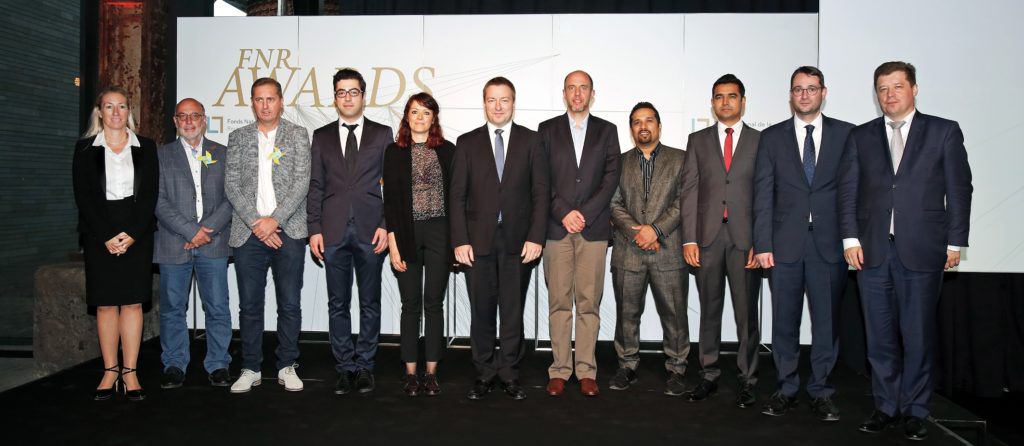On 27th October, the Luxembourg National Research Fund (FNR) held the ninth edition of the FNR Awards on the Belval campus in Esch-sur-Alzette, presenting seven awards for excellence in research, innovation and science communication. Dr Mahesh Desai, Principal Investigator at LIH’s Department of Infection and Immunity, received the FNR Award for “Outstanding Scientific Publication” for his first-authorship on a publication in the prestigious journal Cell, published in the November issue of 2016.
Solemn award ceremony
The aim of the FNR Awards is to reward outstanding researchers and science communicators along with their individual institutions. In presence of the Luxembourg research community, the awards endowed with a 5000 EUR prize, were handed by Marc Hansen, Luxembourg’s Minister Delegate for Higher Education and Research, Véronique Hoffeld, Chair of the Board of the FNR, and Dr Marc Schiltz, Secretary General of the FNR.
This year, four of the seven awards were granted to researchers in microbiology, testifying the concerted efforts that Luxembourg’s research community pursues in this area of research. Among these is Dr Desai, receiving the FNR Award for “Outstanding Scientific Publication” for his publication entitled “A dietary fiber-deprived gut microbiota degrades the colonic mucus barrier and enhances pathogen susceptibility”.
“Good” gut bacteria can turn “bad”
Dr Desai’s publication reports that when the human gut microbiota is deprived of dietary fibre, an indigestible food component contained in many fruits and vegetables, it compensates the lack of nutrients by degrading the mucus barrier that lines the intestinal wall. This substantially increases the risk of pathogen infection.
The scientist explains it in simpler terms: ‘The community of “good” bacteria can turn “bad” when they do not receive enough fibre. As a consequence, the bacteria start eating up the mucus lining of the gut, which serves as the first line of defense against external aggressions and pathogens. This can promote infections, cause digestive problems or in the long term may potentially lead to inflammatory bowel disease or colon cancer. Our findings confirm what researchers and physicians have been telling us for decades: eat a lot of fibre from various sources’. The study opens up avenues for treating intestinal diseases with dietary therapeutics.
A collaborative work
The outcomes of this research result from an inter-disciplinary collaboration under the lead of LIH’s Department of Infection and Immunity together with LIH's Department of Oncology, the Luxembourg Centre for Systems Biomedicine (LCSB) of the University of Luxembourg, the University of Michigan Medical School (Ann Arbor, US), the Washington University School of Medicine (St-Louis, US), and the Aix-Marseille University (Marseille, France). The study was primarily supported by FNR INTER Mobility and CORE grants as well as an R01 grant of the National Institutes of Health and intramural funds from LIH.
Dr Desai’s career path
Dr Mahesh Desai, started his work at LIH on 1st October 2015 as a Principal Investigator, to establish the research group “Eco-Immunology and Microbiome”. He developed a new line of research at the institute on the human gut microbiome.
Originally from India, he completed a PhD in Intestinal Microbiology at the Max Planck Institute for Terrestrial Microbiology in Marburg (Germany) and later worked as a postdoctoral researcher at the University of Göttingen (Germany), the University of Michigan Medical School (United States) and the LCSB at the University of Luxembourg before joining LIH.
Acceptance speech at the award ceremony
Dr Desai’s held a short acceptance speech after having received his award: ‘I thank the FNR for their generous financial support through different funding instruments, Prof Eric Martens from The University of Michigan for a wonderful long-standing collaboration and above all for being a source of inspiration, the members of my team and all collaborators, in particular the co-authors of the publication from Luxembourg: Prof Paul Wilmes, Mathis Wolter and Arnaud Muller. I am also grateful to Prof Rudi Balling, Director of the LCSB, Dr Catherine Larue, former CEO ad interim of LIH and Dr Ulf Nehrbass, our new CEO. Special thanks go to Prof Markus Ollert, Director of the Department of Infection and Immunity, who got excited about my work long before it was known and did everything to bring me back from the United States to Luxembourg. And finally I thank my wife and daughter who are not co-authors on the paper, but still made invaluable contributions behind the scenes.’
LIH contributed to yet another award
The other FNR Award for “Outstanding Scientific Publication” was given to Dr Pranjul Shah and Prof Paul Wilmes from the LCSB, University of Luxembourg, for their publication “A microfluidics-based in vitro model of the gastrointestinal human-microbe interface” in the open access journal Nature Communications. It describes a new laboratory device called HuMiX that allows studying the interactions between human cells and gut bacteria, mimicking the microenvironment in the gut. Dr Mahesh Desai and Dr Carole Devaux from LIH’s Department of Infection and Immunity contributed to the HuMiX technology by showing that it is possible to introduce immune cells, which are critical players in gut homeostasis, into the system.
Left to right: Véronique Hoffeld; Will Reiter; Guy Putz; Pouyan Ziafati; Esther Breithoff; Marc Hansen; Paul Wilmes; Pranjul Shah; Mahesh Desai; Christian Penny; Marc Schiltz (Credits: FNR)
Read Dr Desai’s publication:
A dietary fiber-deprived gut microbiota degrades the colonic mucus barrier and enhances pathogen susceptibility
Watch a video on Dr Desai’s findings:
Watch a video on the HuMix technology:
Get to know all FNR awardees: https://www.fnr.lu/news/fnr-awards-2017-excellence-research-innovation-science-communication/

